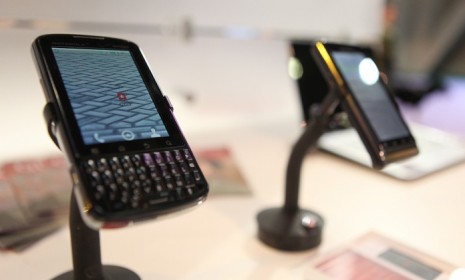Faster smartphones: What is 4G, exactly?
Verizon is readying the launch of its new high-speed network. But what does it really offer — and do you actually need it?

A free daily email with the biggest news stories of the day – and the best features from TheWeek.com
You are now subscribed
Your newsletter sign-up was successful
On Sunday, Verizon will launch its new 4G (or fourth generation) network, which promises to deliver much faster downloading speeds than its current 3G standard. For many customers, however, "4G" is still a a mysterious concept. As David Goldman at CNN says the term "has become meaningless and confusing as hell for wireless customers." Here's a quick guide to the technology:
How is 4G defined?
Last month, the International Telecommunication Union, which defines wireless standards around the world, designated a 4G network as one that's "capable of download speeds of 100 megabits per second." That's quick enough to "download an average high-definition movie in about three minutes." According to Verizon, "users will be able to download 20 photos in 60 seconds or a two-hour movie in five minutes." (See a Network World 4G demo)
The Week
Escape your echo chamber. Get the facts behind the news, plus analysis from multiple perspectives.

Sign up for The Week's Free Newsletters
From our morning news briefing to a weekly Good News Newsletter, get the best of The Week delivered directly to your inbox.
From our morning news briefing to a weekly Good News Newsletter, get the best of The Week delivered directly to your inbox.
Besides speed, what makes it better?
The network may make it easier to "install the Internet in a wider range of gadgets, such as digital cameras, gaming systems, and picture frames."
Isn't 4G already available on other networks?
Yes, but not as widely as the phone companies would have you believe. AT&T claims to have the "world's largest 4G network," but that network actually doesn't meet the international standard. (Further muddying matters, certain 3G networks are actually faster than the 4G network Verizon will roll out.) Meanwhile, Sprint sells multiple 4G-ready phones, like the HTC Evo, but doesn't offer a network like the one Verizon is launching. Given all the confusion over terminology, some tech commentators think that terms like "3G" and "4G" will fade in significance as early as next year.
A free daily email with the biggest news stories of the day – and the best features from TheWeek.com
How many people will be able to use it?
By the end of the year, Verizon's 4G network will be available to about 110 million people in 38 American cities and 60 airports. Initially, access will be restricted to customers with computers (equipped with a $100 plug-in accessory) and a monthly 4G data plan. In 2011, Verizon is expected to release the first smartphones designed to run on its 4G network.
Do you need 4G now?
"For consumers," says Sascha Segan at PC Mag, "4G is mostly about internet speeds... 3G will be just fine for most people through 2011, unless they absolutely demand ultimate speed." You might as well just wait until next year, agrees Dan Frommer at Business Insider: "4G is more likely to be a Holidays 2012 or 2013 story for most people than 2010 or 2011."
Sources: Business Insider, CNN, CNN Money, PCMag
-
 The mystery of flight MH370
The mystery of flight MH370The Explainer In 2014, the passenger plane vanished without trace. Twelve years on, a new operation is under way to find the wreckage of the doomed airliner
-
 5 royally funny cartoons about the former prince Andrew’s arrest
5 royally funny cartoons about the former prince Andrew’s arrestCartoons Artists take on falling from grace, kingly manners, and more
-
 The identical twins derailing a French murder trial
The identical twins derailing a French murder trialUnder The Radar Police are unable to tell which suspect’s DNA is on the weapon